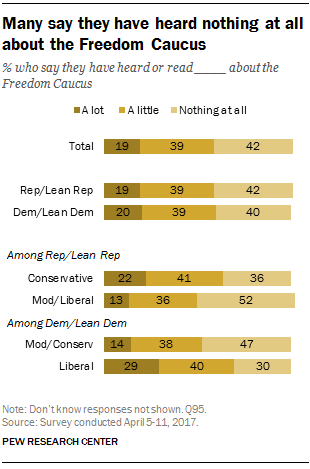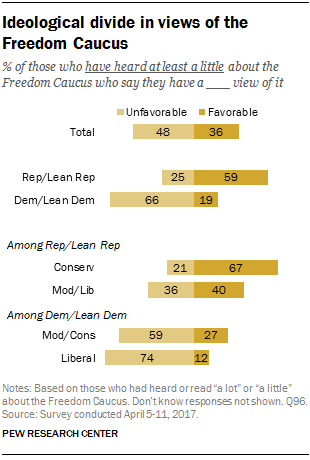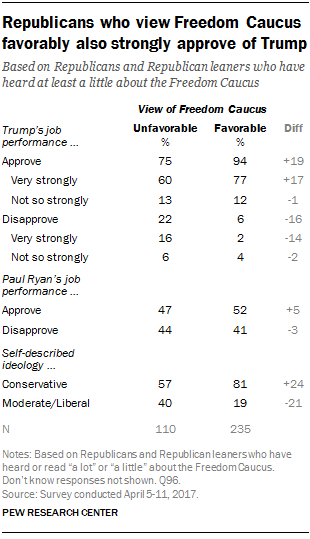The House Freedom Caucus drew attention from the White House, lawmakers on Capitol Hill and the press last month because of its opposition to GOP health care legislation. But despite its prominence in Washington, the group is little known to many Americans.

About four-in-ten adults (42%) say they have heard “nothing at all” about the caucus, according to a Pew Research Center survey conducted April 5-11 among 1,501 U.S. adults. Another 39% say they have heard “a little” about it, while only about one-in-five Americans (19%) say they have heard “a lot” about the group.
The House Freedom Caucus is a group of conservative Republican lawmakers in the lower chamber of Congress. It was formed in January 2015, and while the caucus does not make its membership public, it is believed to consist of about three dozen lawmakers who share the goal of pushing House GOP leaders toward more conservative positions on fiscal and social issues.
In addition to its opposition to the White House-backed health care bill last month, the caucus also reportedly played a role in the resignation of former House Speaker John Boehner in 2015.

Democrats and Republicans are about equally likely to say they have not heard of the Freedom Caucus. However, in both parties, the caucus is better known among the more ideological. About half (52%) of moderate and liberal Republicans have heard nothing at all about the caucus, compared with just 36% of conservative Republicans. Among Democrats, 47% of conservatives and moderates, compared with 30% of liberals, have heard nothing at all about the caucus.
Americans who have heard of the House Freedom Caucus are more likely to have negative than positive views of it. Overall, 36% of these adults view the group favorably and 48% view it unfavorably, and opinions vary sharply by political affiliation.
Among Republicans and Republican-leaning independents who have heard of the caucus, 59% view it favorably and 25% view it unfavorably. The reverse is true among Democrats and Democratic leaners: About two-thirds (66%) of those who have heard of the group view it unfavorably, while one-in-five (19%) view it favorably. Among conservative Republicans who have heard of the caucus, 67% view it favorably; among liberal Democrats who have heard of the group, 74% view it unfavorably.

Despite the clash over health care legislation last month between the White House and members of the Freedom Caucus – and Trump’s subsequent criticism of the group – Republicans who hold a favorable view of the caucus are significantly more likely than those with an unfavorable view of it to approve of Trump’s job performance. Among Republicans and Republican leaners who view the Freedom Caucus favorably, 94% approve of the job Trump is doing as president. By contrast, among Republicans with an unfavorable view of the caucus, a smaller majority (75%) approve of Trump’s job performance.
